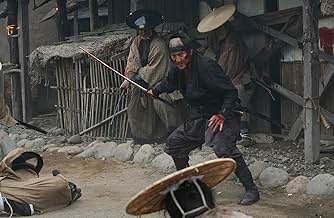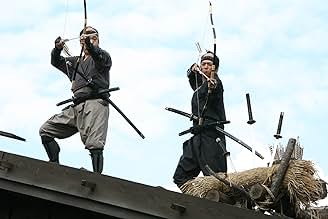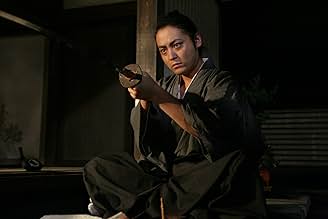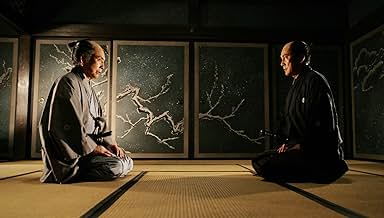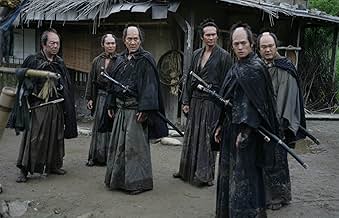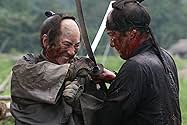A group of assassins come together for a suicide mission to kill an evil lord.A group of assassins come together for a suicide mission to kill an evil lord.A group of assassins come together for a suicide mission to kill an evil lord.
- Director
- Writers
- Stars
- Awards
- 15 wins & 28 nominations total
- Director
- Writers
- All cast & crew
- Production, box office & more at IMDbPro
Featured reviews
If you've never seen anything by director Miike Takashi then be prepared for a no-holds barred film. I've been a bit of a fan for many years having watched some of his best known films (e.g. Audtion and The Dear or Alive trilogy) and have quite liked his style. It may disturb as much as it amazes, but you will have to acknowledge some great film-making.
The énfant terrible of Asian film-making world (according to one review I read) here he takes a complete sidestep with this take on the traditional samurai tale. A group of samurai are brought together to bring down a sadistic Lord who is expected in time to be elevated to higher levels of authority. As a foil to the group is another senior samurai figure who is hell-bent on protecting the Lord in belief that it is their duty not to take politics in their own hands but to serve.
Some very violent scenes, the story is excellent and builds up to a long battle scene which sees our heavily outnumbered group battle to complete their mission. The fight scenes are incredibly well choreographed and paced excellently, and very violent also as you would expect.
It's not just the action that is the crux of the film, but actually the story is well done and the acting is exceptional. One added member of the group (admittedly not a samurai) adds some comic relief which helps to ease the tension at times, and is a nice touch.
The settings are exceptional and the dialogue is excellent. It can be difficult to follow early on as you try to figure out the political world and the figures that are relevant in this world, but you will capture the gist of what is to be taken from it all.
I thoroughly enjoyed it and if you are into old Samurai tales then this is one for watch. Very engrossing and will likely be one for repeat viewing.
The énfant terrible of Asian film-making world (according to one review I read) here he takes a complete sidestep with this take on the traditional samurai tale. A group of samurai are brought together to bring down a sadistic Lord who is expected in time to be elevated to higher levels of authority. As a foil to the group is another senior samurai figure who is hell-bent on protecting the Lord in belief that it is their duty not to take politics in their own hands but to serve.
Some very violent scenes, the story is excellent and builds up to a long battle scene which sees our heavily outnumbered group battle to complete their mission. The fight scenes are incredibly well choreographed and paced excellently, and very violent also as you would expect.
It's not just the action that is the crux of the film, but actually the story is well done and the acting is exceptional. One added member of the group (admittedly not a samurai) adds some comic relief which helps to ease the tension at times, and is a nice touch.
The settings are exceptional and the dialogue is excellent. It can be difficult to follow early on as you try to figure out the political world and the figures that are relevant in this world, but you will capture the gist of what is to be taken from it all.
I thoroughly enjoyed it and if you are into old Samurai tales then this is one for watch. Very engrossing and will likely be one for repeat viewing.
In 1844, the peace of the Feudal Japan is threatened by the cruel Lord Naritsugu Matsudaira (Gorô Inagaki) that is politically rising and getting closer to his half-brother, the shogun. After the harakiri of Namiya clan leader, the samurai Shinzaemon Shimada (Kôji Yakusho) is summoned by the shogun's adviser Sir Doi (Mikijiro Hira) of the Akash Clan to listen to the tragedy of Makino Uneme ((Takumi Saitô), whose son and daughter-in-law have been murdered by Naritsugu. Then Sir Doi shows a woman with arms, legs and tongue severed by Naritsugu and she writes with her forearm a request to Shinza to slaughter Naritsugu and his samurais.
Shinza promises to kill Naritsugu and he gathers eleven other samurais and plots a plan to attack Naritsugu in his trip back to the Akash land. But the cunning samurai Hanbei Kitou (Masachika Ichimura) that is responsible for the security of his master foresees Shinza's intent. Shinza decides to go with his samurais through the mountain, where they find the hunter Koyata (Yûsuke Iseya) that guides them off the mountain and joins the group. Now the thirteen men prepare an ambush to Naritsugu and his army of two hundred samurais in a suicide mission to stop evil.
"Jûsan-nin no shikaku", a.k.a, "13 Assassins", is a future classic of the samurai genre by Takashi Miike. It is inevitable to compare this film with Akira Kurosawa's "Seven Samurais" and the epic "The 300 Spartans", but "13 Assassins" is among the best samurais movies I have ever seen, with a solid story in the Edo period of Japan, stunning cinematography, wonderful performances and fantastic choreography in the battle scenes. My vote is nine.
Title (Brazil): "13 Assassinos" ("13 Assassins")
Shinza promises to kill Naritsugu and he gathers eleven other samurais and plots a plan to attack Naritsugu in his trip back to the Akash land. But the cunning samurai Hanbei Kitou (Masachika Ichimura) that is responsible for the security of his master foresees Shinza's intent. Shinza decides to go with his samurais through the mountain, where they find the hunter Koyata (Yûsuke Iseya) that guides them off the mountain and joins the group. Now the thirteen men prepare an ambush to Naritsugu and his army of two hundred samurais in a suicide mission to stop evil.
"Jûsan-nin no shikaku", a.k.a, "13 Assassins", is a future classic of the samurai genre by Takashi Miike. It is inevitable to compare this film with Akira Kurosawa's "Seven Samurais" and the epic "The 300 Spartans", but "13 Assassins" is among the best samurais movies I have ever seen, with a solid story in the Edo period of Japan, stunning cinematography, wonderful performances and fantastic choreography in the battle scenes. My vote is nine.
Title (Brazil): "13 Assassinos" ("13 Assassins")
"Thirteen. The time has come to lay down your lives for the greater cause. Are you ready?"
13 Assassins is all about the payoff. And the payoff comes in the form of 50 minutes of absolute carnage at the end of the movie. The story is about 13 warriors, some of the last truly capable samurai at a time when the era of those legendary soldiers was coming to an end, who band together to kill a despicable, deranged and utterly evil lord who is step-brother and future heir to the ruling shogun. Greatly outnumbered, the men devise a plan to force Lord Naritsugu and his guards to a village that they've prepared as what can only be called as a deathtrap.
If you liked the "Crazy 88's" fight from Kill Bill Volume 1 or the massive battle at the end of Azumi, then the epic showdown at the end of 13 Assassins automatically makes this a must see. But what about the preceding half of the movie? Most of that time is spent introducing us to the 13 assassins, Sir Hanbei - the noble but loyal to a fault man who is in charge of Lord Naritsugu's safety, and making us hate (and I mean REALLY hate) the lord himself. This portion of the movie was necessary to setup finale, but it was understandably not as exciting or captivating as the lengthy battle it precedes.
Rest assured though, the storytelling doesn't stop when the action begins. Some action scenes in movies can be so endless that they become monotonous (and boring, as a result), but 13 Assassins neatly avoids that trap by including character development until the very end.
This is a brutal, visceral movie, from the sadism of Lord Naritsugu to the blood-soaked, frenetic finale. If that sounds like something you'd be interested in, I heartily recommend that you give it a shot.
13 Assassins is all about the payoff. And the payoff comes in the form of 50 minutes of absolute carnage at the end of the movie. The story is about 13 warriors, some of the last truly capable samurai at a time when the era of those legendary soldiers was coming to an end, who band together to kill a despicable, deranged and utterly evil lord who is step-brother and future heir to the ruling shogun. Greatly outnumbered, the men devise a plan to force Lord Naritsugu and his guards to a village that they've prepared as what can only be called as a deathtrap.
If you liked the "Crazy 88's" fight from Kill Bill Volume 1 or the massive battle at the end of Azumi, then the epic showdown at the end of 13 Assassins automatically makes this a must see. But what about the preceding half of the movie? Most of that time is spent introducing us to the 13 assassins, Sir Hanbei - the noble but loyal to a fault man who is in charge of Lord Naritsugu's safety, and making us hate (and I mean REALLY hate) the lord himself. This portion of the movie was necessary to setup finale, but it was understandably not as exciting or captivating as the lengthy battle it precedes.
Rest assured though, the storytelling doesn't stop when the action begins. Some action scenes in movies can be so endless that they become monotonous (and boring, as a result), but 13 Assassins neatly avoids that trap by including character development until the very end.
This is a brutal, visceral movie, from the sadism of Lord Naritsugu to the blood-soaked, frenetic finale. If that sounds like something you'd be interested in, I heartily recommend that you give it a shot.
I'm a huge fan of Takashi Miike, so I was very excited to be able to attend a sneak peek of his latest film. Miike's one of those directors who seems to be trying to make at least one film in every style, and this latest is his foray into the classic "samurai avenging injustices" genre. Only, we all know by now that Miike's style is anything but "classic." He always manages to find a way to infuse his own unique, warped imprint into everything he touches. Especially since he insists on making the most bizarre cameos possible in all the films he directs. They are always really fun to watch for.
So, this film is great. It starts off just as slowly as any of these old period pieces set in feudal era Japan, but it quickly descends into pure mayhem and madness. Shinzaemon is a retired samurai, but he is prompted back into action when he learns that the Shogun's "adopted" (code for bastard) son, Lord Naritsugu, has been terrorizing peasants. He's been killing and mutilating men, women and children all throughout the land, and all with the most cold- hearted, disinterested cruelty. So Shinzaemon decides to assemble a band of other idle samurai to hunt this despot down and assassinate him. Those would be the thirteen assassins that give this film its title. And they really are a very mismatched band of warriors. And these men are caricatures—each outrageous in his own way.
The one thing I really love about Takashi Miike's style is that he's never afraid to just go for it. He's got no shame, and absolutely no restraint. I think this is because he has a deep-rooted sense of humor (albeit a very dark one). It's an ability to identify and appreciate the absurdity in life. Miike's films have a reputation for being pretty violent and bloody (and this one is certainly no exception). But they are also incredibly funny. The gore is certainly meant to shock, but I don't think it's just for the sake of a cheap thrill. I think it's meant to throw us of balance. His work is horrifying where we expect delicacy, and actually quite subtle where viewers typically expect to find vulgarity. Of course, we can always count on Miike for some truly silly stunts too. The result is audiences that are quite delighted and amused, even after witnessing all the horror and disfigurement and devastation. Those moments are upsetting and heartbreaking, for sure. But, Miike really understands how a film should flow, and balances these difficult scenes with the right dose of irreverence. He's a true master, and this film is a roaring success.
So, this film is great. It starts off just as slowly as any of these old period pieces set in feudal era Japan, but it quickly descends into pure mayhem and madness. Shinzaemon is a retired samurai, but he is prompted back into action when he learns that the Shogun's "adopted" (code for bastard) son, Lord Naritsugu, has been terrorizing peasants. He's been killing and mutilating men, women and children all throughout the land, and all with the most cold- hearted, disinterested cruelty. So Shinzaemon decides to assemble a band of other idle samurai to hunt this despot down and assassinate him. Those would be the thirteen assassins that give this film its title. And they really are a very mismatched band of warriors. And these men are caricatures—each outrageous in his own way.
The one thing I really love about Takashi Miike's style is that he's never afraid to just go for it. He's got no shame, and absolutely no restraint. I think this is because he has a deep-rooted sense of humor (albeit a very dark one). It's an ability to identify and appreciate the absurdity in life. Miike's films have a reputation for being pretty violent and bloody (and this one is certainly no exception). But they are also incredibly funny. The gore is certainly meant to shock, but I don't think it's just for the sake of a cheap thrill. I think it's meant to throw us of balance. His work is horrifying where we expect delicacy, and actually quite subtle where viewers typically expect to find vulgarity. Of course, we can always count on Miike for some truly silly stunts too. The result is audiences that are quite delighted and amused, even after witnessing all the horror and disfigurement and devastation. Those moments are upsetting and heartbreaking, for sure. But, Miike really understands how a film should flow, and balances these difficult scenes with the right dose of irreverence. He's a true master, and this film is a roaring success.
This film was a dark-edged delight from beginning to end when I saw it at the 2010 edition of TIFF. The audience there loved it too, breaking out into spontaneous applause during several scenes.
Solid direction by Miike, great characters, beautifully shot and simply some of the best and most intense action sequences put on film - ever! It does have it's obvious influences, such as Kurosawa's "Seven Samurai", but damn, this one kicks ass mightily! You've never seen Shogun like this! And something else to point out: the sound on this film was thundering, shaking and stellar! THIS is the kind of film that reminds us why we go to a movie theatre to enjoy a film on a big screen, why we turn off our cell phones and immerse ourselves in the experience of cinema-going, as opposed to staying home on our couches.
I'll go see it again on the big screen when it hopefully returns to town - you can bet on that!
Solid direction by Miike, great characters, beautifully shot and simply some of the best and most intense action sequences put on film - ever! It does have it's obvious influences, such as Kurosawa's "Seven Samurai", but damn, this one kicks ass mightily! You've never seen Shogun like this! And something else to point out: the sound on this film was thundering, shaking and stellar! THIS is the kind of film that reminds us why we go to a movie theatre to enjoy a film on a big screen, why we turn off our cell phones and immerse ourselves in the experience of cinema-going, as opposed to staying home on our couches.
I'll go see it again on the big screen when it hopefully returns to town - you can bet on that!
Did you know
- TriviaThe opening sequence of this film is a shot by shot recreation of the 1960s era original.
- Quotes
Kujuro Hirayama: No mercy! There's no samurai code or fair play in battle! No sword? Use a stick. No stick? Use a rock. No rock? Use your fists and feet! Lose your life, but make the enemy pay!
- Crazy creditsAlthough most of the opening credits after the distributor's name are in Japanese, there are three in English: Recorded Picture Company, Yahoo! Japan, and Tsutaya.
- Alternate versionsThe runtime of the Japanese release is 141 minutes, for but the international distribution a reduced cut of 126 minutes was released, which among other things omits some scenes referring to Japanese mythology (such as several scenes which indicate that the hunter Koyata is not of human flesh, but a demon).
- ConnectionsFeatured in At the Movies: Venice Film Festival 2010 (2010)
Details
- Release date
- Countries of origin
- Official sites
- Language
- Also known as
- 13 asesinos
- Filming locations
- Production companies
- See more company credits at IMDbPro
Box office
- Budget
- $6,000,000 (estimated)
- Gross US & Canada
- $802,778
- Opening weekend US & Canada
- $45,854
- May 1, 2011
- Gross worldwide
- $18,689,058
- Runtime
- 2h 21m(141 min)
- Color
- Sound mix
- Aspect ratio
- 2.35 : 1
Contribute to this page
Suggest an edit or add missing content




